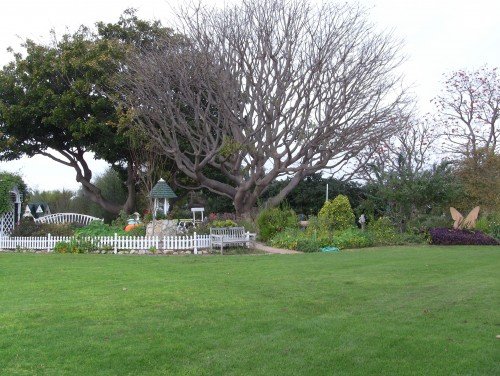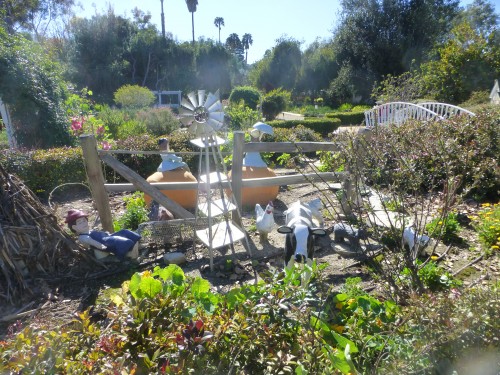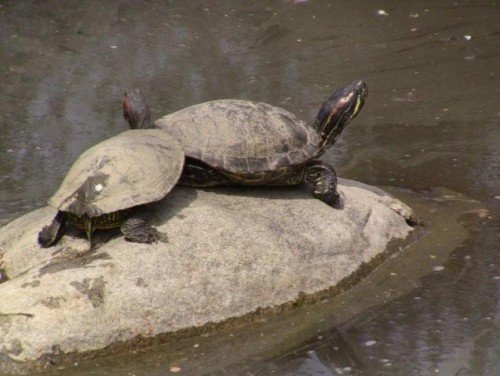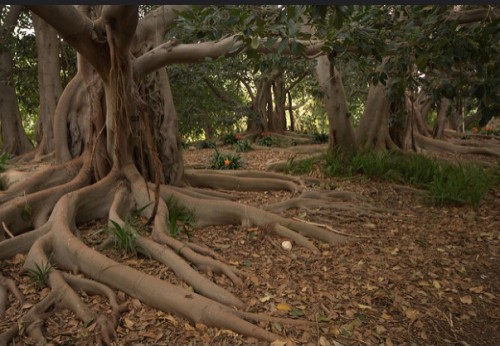South Coast Botanic Garden
On a beclouded winter day, when the sun cast a soft glow through the subdued haze and a mild gust stirred the air, I had the pleasure of visiting the South Coast Botanic Garden with my family. We picked a day that happened to be perfect: not too cold or too hot, and uncrowded, this urban oasis made for an easy escape from the harried city of Los Angeles.

Who would have thought that this special place is one of the world’s first botanical gardens to be developed over a sanitary landfill? I did not know this until quite some time after I had visited. It was only when I came to write about this enchanted venue that I learned this. In fact, while doing a bit of background research, I found myself drawn off topic altogether onto a tangent which led me to learning more about landfills! Tangents can be fascinating, although this one took the better part of an hour so that the gardens had to wait while I was drawn into the intriguing world of waste management and landfill sites. It may sound unsavory, but it’s a very important part of life. It’s almost like sewer treatment, which is interesting also, and another tangent I will refrain from taking now. While it’s not something one would talk about at a social function, I immediately shared what I learned with my family because the whole landfill process is actually very interesting. But then again, I tend to find almost any topic interesting… almost.
Now that the South Coast Botanic Garden’s humble beginnings have been revealed, I will return to the garden itself, a much more lovely and palatable topic.

The Garden covers 87 acres with a wide diversity of shrubs, trees, and colorful flowers blooming throughout the year. There are plants native to California, attracting lots of birds, bees and butterflies. There are also numerous flowers among lush greenery including roses, carnations, poppies, dahlias, sage, sunflowers, daisies, lilies and many more blooms. One almost does not know where to look first. Every corner, every spot—sunny or shady—has its treasures waiting to be discovered. It’s beautiful.
Imagine strolling along the open paths or the narrower windy trails and pausing to see dew drops collect on silken webs like delicate strands of tiny pearls. They reflect the dappled light with a soft luster which only nature can bestow. There are the popular Children’s Garden and Discovery Garden incorporating nursery rhymes with plants to match the stories. Things like a dollhouse and bridge, a secret tunnel, worm bin, alphabet garden, butterfly garden, and whimsical characters delight children’s imaginations.

Other highlights include the Desert Garden, Display Greenhouse, Japanese Garden and Koi Pond, Mediterranean Garden, Rose Garden, a tranquil lake with turtles and dragonflies, a Palm Collection, Redwood Grove, Vegetable Garden, Ficus Collection, Rare Fruit Orchard, Gift Shop, Picnic Area and Amphitheatre.

But my personal favorite is the Banyan Grove. I’ve always loved Banyan trees because they just appear so massive and dominating and powerful. One cannot help feeling small next to them, though that’s not an unpleasant thing at all. Banyans are the world’s biggest trees in terms of the area they cover. These strangler fig trees overpower and smother their hosts, sending down roots which grow into stout pillars appearing like new tree trunks. It is said that Alexander the Great was so fascinated by them, he had notes and illustrations taken back to Greece to share with Theophrastus, the founder of modern botany. Their prehistoric allure is utterly romantic. They tug at the imagination with their imposing strength—-mine at least.

Their massive tangle of roots and cool understory are almost like something out of a fairy tale. I feel as though I have stepped into an enchanted forest far away from civilization: a place where nature rules, mighty, indomitable and uncompromising, but benevolent enough if you approach with a humble sense of awe. I enjoy meandering through the grove in a kind of enraptured trance, half-expecting a horse and its fearless rider to appear suddenly through the trees. Who goes there? I ask in a shaky whisper, turning suddenly to glance around. But it is only a fallen leaf, or so I tell myself while exhaling the breath I was not even aware I held.

Yes, places like this do strange and wondrous things to the imagination. They breathe a vivid and fanciful dimension into life, sprinkling it with a liberal dose of mystery and romance as nature often does.
Come see the Banyan Grove and numerous other splendid things at the South Coast Botanic Gardens. Whether you spend half an hour, or half a day, it will be time well-spent. The Garden is open from 9:00-5:00 daily year-round except for Christmas Day, with a variety of programs and events for families and kids. There are docent-led tours, tram tours, or simply self-guided walking tours if you so desire, and which I personally find to be the most intimate and enjoyable. I have not seen my imaginary horse and fearless rider in the Banyan Grove yet, but perhaps you will. Please send him my regards if you do…
AUTHOR: Jocelyn Murray
Jocelyn Murray is a travel writer and historical fiction novelist. She has a special interest in history and archaeology which feeds her passion for writing. She holds two university master's degrees in both English and Education, along with a bachelor's degree in Economics and European Studies. She also has a teaching credential and taught at the elementary school level.
Hi! I am a robot. I just upvoted you! I found similar content that readers might be interested in:
http://www.totsandtravel.com/2017/10/16872/south-coast-botanic-garden/
Hi @cheetah. Speaking of cats, we saw a cat at the Botanic Gardens. It lives there with a couple other cats. @catfacts might be interested in that too.
A cat can spend five or more hours a day grooming himself.
This is true. Cats are fastidious that way. They love to be clean.
Cats lived with soldiers in trenches, where they killed mice during World War I.
Cats are wonderful at keeping the vermin population in check, even in the trenches!
In multi-cat households, cats of the opposite sex usually get along better.
People are sort of that way too.